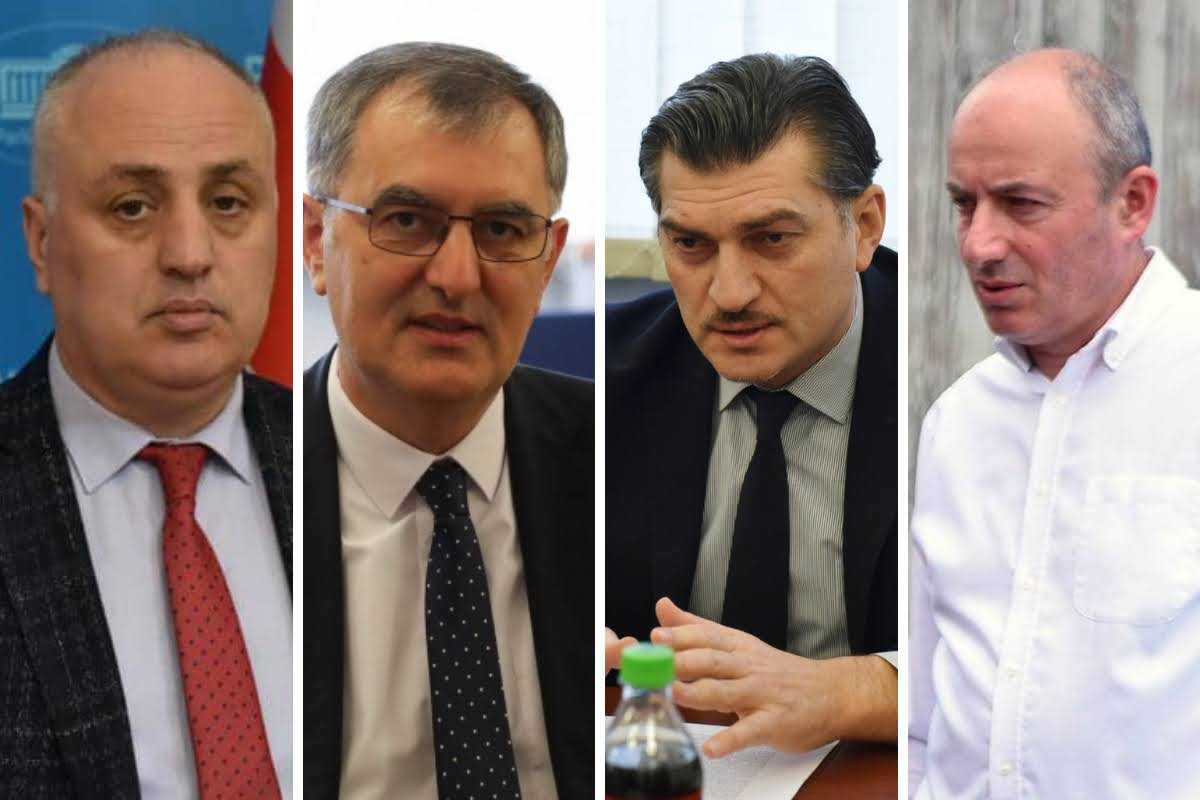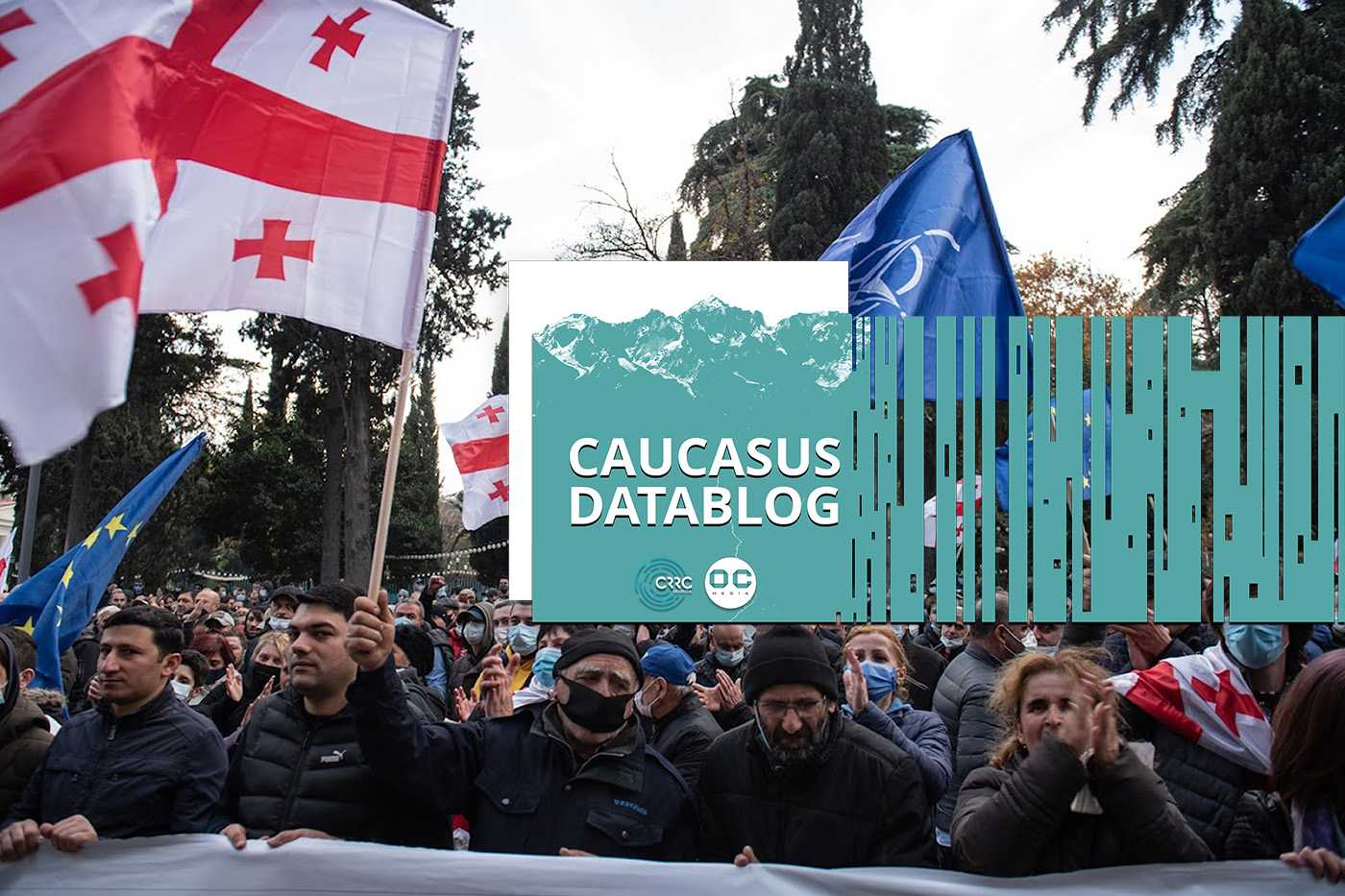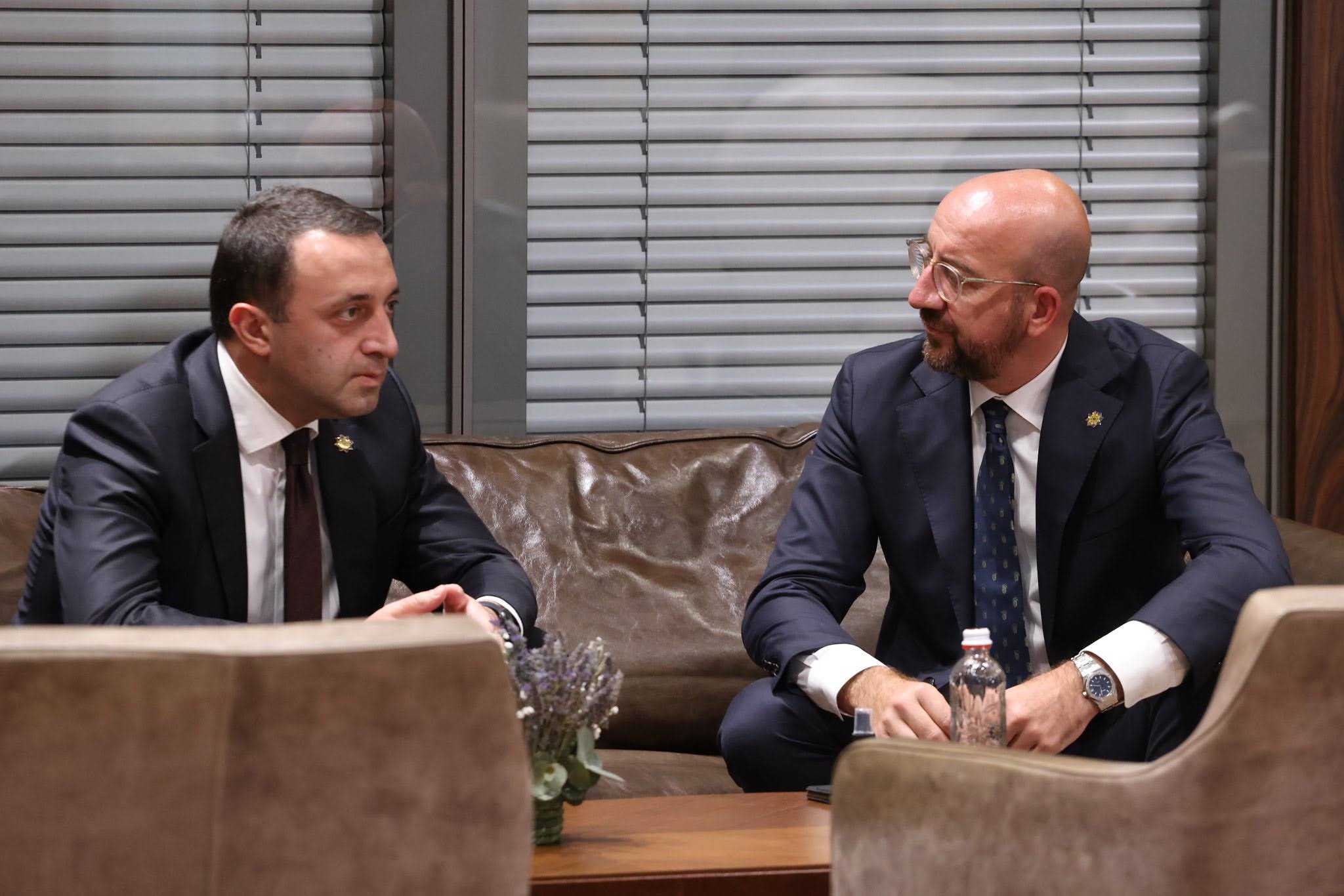
The rise of illiberalism in Georgia is turning heads in Brussels and yet still, the country is pushing ambitious foreign policy goals with the EU. In light of discrepancies between domestic policies and foreign policy aspirations, MEPs and pundits tell OC Media that Georgia should prove its ambitions are not just on paper, or the country has much to lose.
On 9 August, Georgian Foreign Minister Davit Zalkaliani bravely presented his country’s ambitious foreign policy, according to which Georgia expects to receive EU membership candidate status by 2030.
What makes Zalkaliani’s declaration so brave is that it came just a month after his government faced a barrage of Western criticism over their sanctioning of violence against journalists and queer activists and only 11 days after the ruling Georgian Dream party’s withdrawal from an agreement with the opposition brokered by EU Council President Charles Michel.
It seems that Georgia, once hailed by the EU as a frontrunner reformer in the Eastern Partnership neighbourhood, is so immersed in domestic political turmoil that the wave of bitter criticism voiced by its European partners is falling on deaf ears in Tbilisi.
In the best-case scenario, the Council President’s continuous visits and unprecedented attention while negotiating the 19 April deal could have ended in a win-win for both Georgia and the EU. The former would break through the political deadlock and retain its position as a poster child of the EU. The latter would have been hailed for its effective intervention in a troubled region and would have proved that Georgia was worth all the resources the EU has been providing.
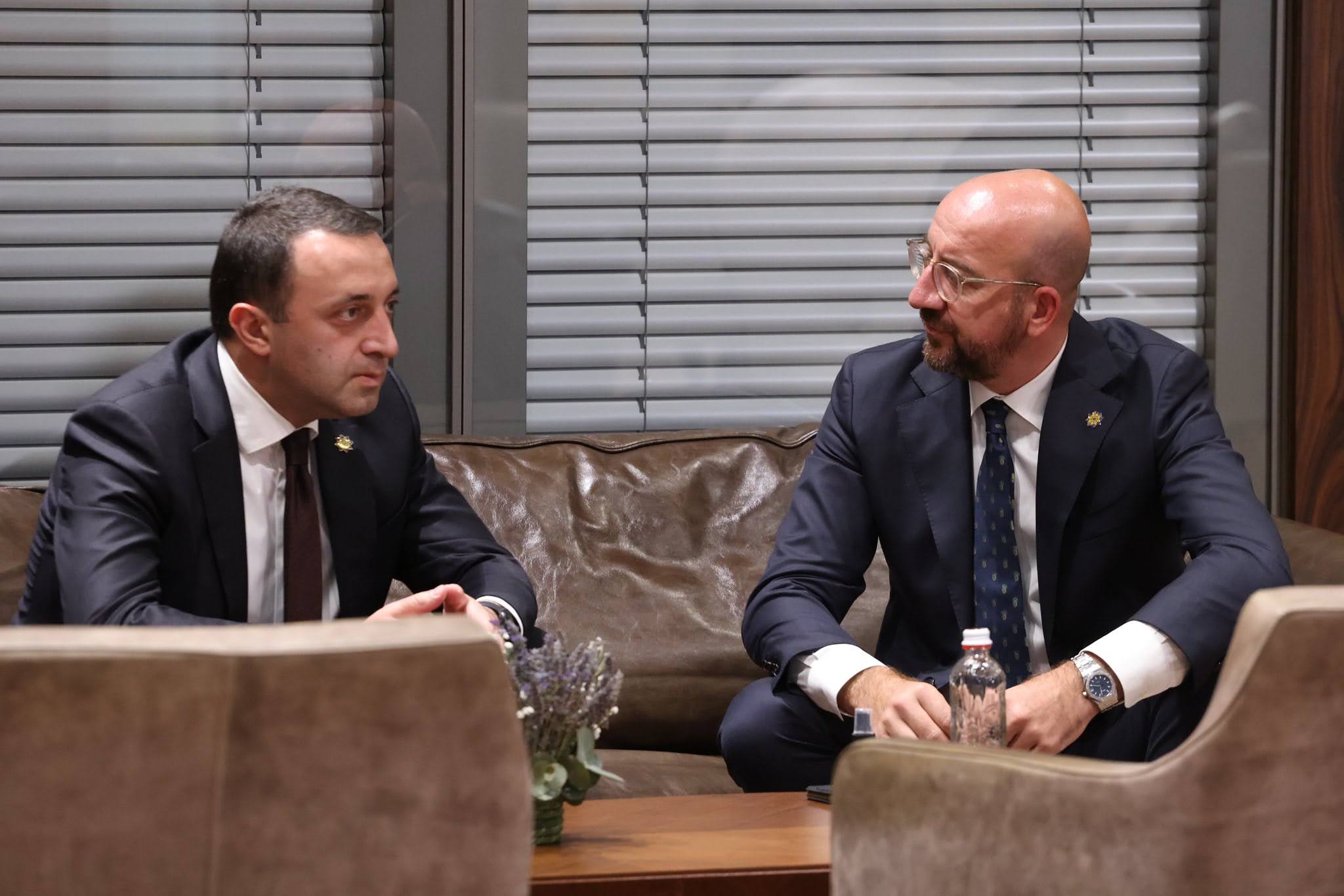
However, things didn’t go that way, and the EU has raised red flags. MEPs have warned that Georgia is derailing from its democratic path, and should this continue, further aid to Georgia will become conditional. This will have financial and political implications for Georgia, which is struggling to cope with an economic downturn and heavily relies on its western partners’ political support to withstand Russian aggression.
Nevertheless, Georgian officials keep asking for acceptance from the EU, disregarding domestic mess. But will Brussels ignore it too?
Messages from Brussels: ‘We are not here to be used and abused’
Despite Georgian PM’s refusal to acknowledge responsibility for inciting violence against journalists, queer and civil activists, or the political opposition, his contribution to the violence on 5 July has not gone unnoticed in Brussels.
OC Media spoke to two members of the European Parliament earlier in July following the violence surrounding the attempt to hold Tbilisi Pride. Both expressed frustration with Georgia’s political leadership and worried that Georgia was drifting away from the EU.
‘We are not here to be used as a tool’, Markéta Gregorová, a Czech MEP from the European Pirate Party, told OC Media. ‘We will see what is not [being] fulfilled and what benefits we will cut off’.
‘[Prime Minister Irakli Gharibashvili] pretty much sounded as [if] he was inciting civil war because he was saying that rallies were anti-democratic and anti-state, that the opposition, in general, is anti-church. For me … it sounds dangerous, [and similar to] what I often hear from Russia and Putin himself. So that’s very disappointing’, Gregorová said.
‘I think this will harm relationships between the EU and Georgia.’
She said that while it did not appear as though the EU was planning to impose any sanctions on Georgia or its political leadership, she was personally disappointed with this reaction.
In the aftermath of the 5 July violence, which left up to 60 journalists injured, one of whom, TV Pirveli cameraman Lekso Lashkarava, died a week later, PM Gharibashvili dubbed calls for his resignation an unsuccessful conspiracy against the state planned and carried out by ‘anti-state anti-church forces’.
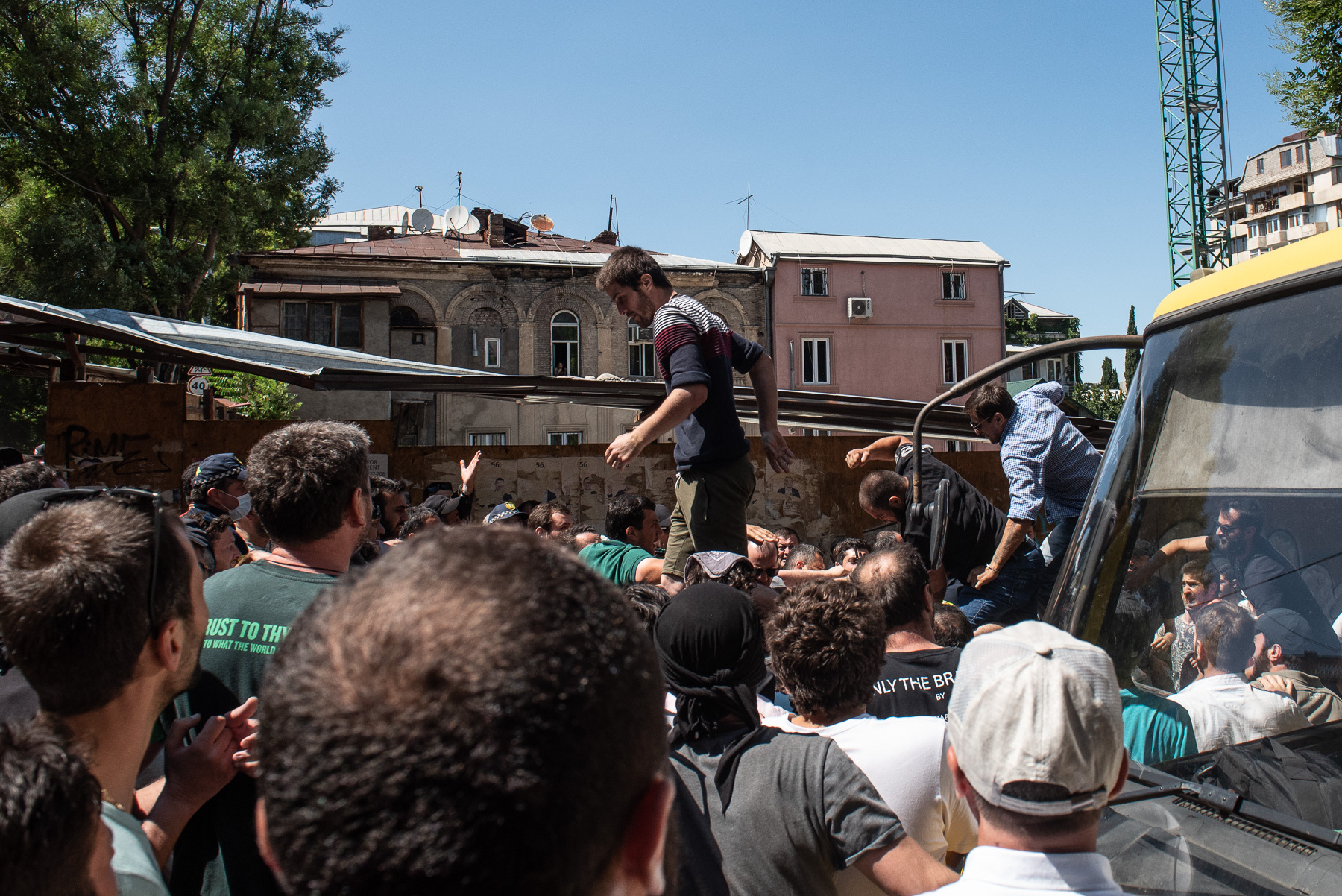
It seems that the ruling Georgian Dream government expects the EU to buy the same story it has been trying to feed the Georgian electorate for years. Discrediting political opponents in a singleminded effort at maintaining power has become a signature of the Georgian Dream government, which is now serving a third term in office. Indeed, the portrayal of political opposition by the PM as puppeteers behind the Tbilisi Pride march which was to take place on 5 July was part of this same scheme.
While such rhetoric is intended for domestic audiences, the government has in the past presented a different narrative for foreign partners. The latter disregards the domestic mess, emphasising reforms and underscoring Georgia’s Euro-Atlantic aspirations. However, the discrepancy between these two narratives has become so evident that leaders in Brussels are finding it hard to ignore.
‘Seeing developments and the stance of the [Georgian] government, I am more and more hesitant to believe that their ambitions in terms of accession to the EU are anywhere than just on paper,’ said Gregorová.
She added that she understood why journalists in Georgia were demanding the PM’s resignation and that stepping down would be ‘a proper [form] of taking responsibility’, but that it was not her place to make such a demand.
‘If we actually helped in negotiations to get Georgia out of the political crisis, and then we see that there is no will to follow up on that, we are not here to be just used and abused’, Gregorová said. ‘Because we need to see something in return, we need to see results, we need to see the will, and that is something that we are absolutely not seeing right now.’
Rasa Juknevičienė, a Lithuanian MEP from the Homeland Union party and a former defence minister, is another official who expressed disappointment over the violence she witnessed in Georgia. She told OC Media in July that rhetoric used by the prime minister was concerning because it was taken by certain people in Georgia as a message to persecute minorities. She underscored that while sanctions were a last resort, they are a possibility.
‘[Sanctions] would be terribly, terribly damaging … But, if it would be necessary and if the leaders of the ruling party will not understand this, it is an option in the future. If they won’t be able to stop violence against journalists, against democracy’, Juknevičienė said.
She characterised the acts of violence as ‘first of all against EU membership, against the future of Georgia with the EU.’
She elaborated that it is not enough just to promise people the government will apply for EU membership but that they also ‘need to act like Europeans.’
‘Of course, I was upset, and many of your friends were upset. But many of us understand that the aggressive people who took down the EU flag are a small minority, and we have them in all countries. Believe me, it’s not only Georgia’s issue.’
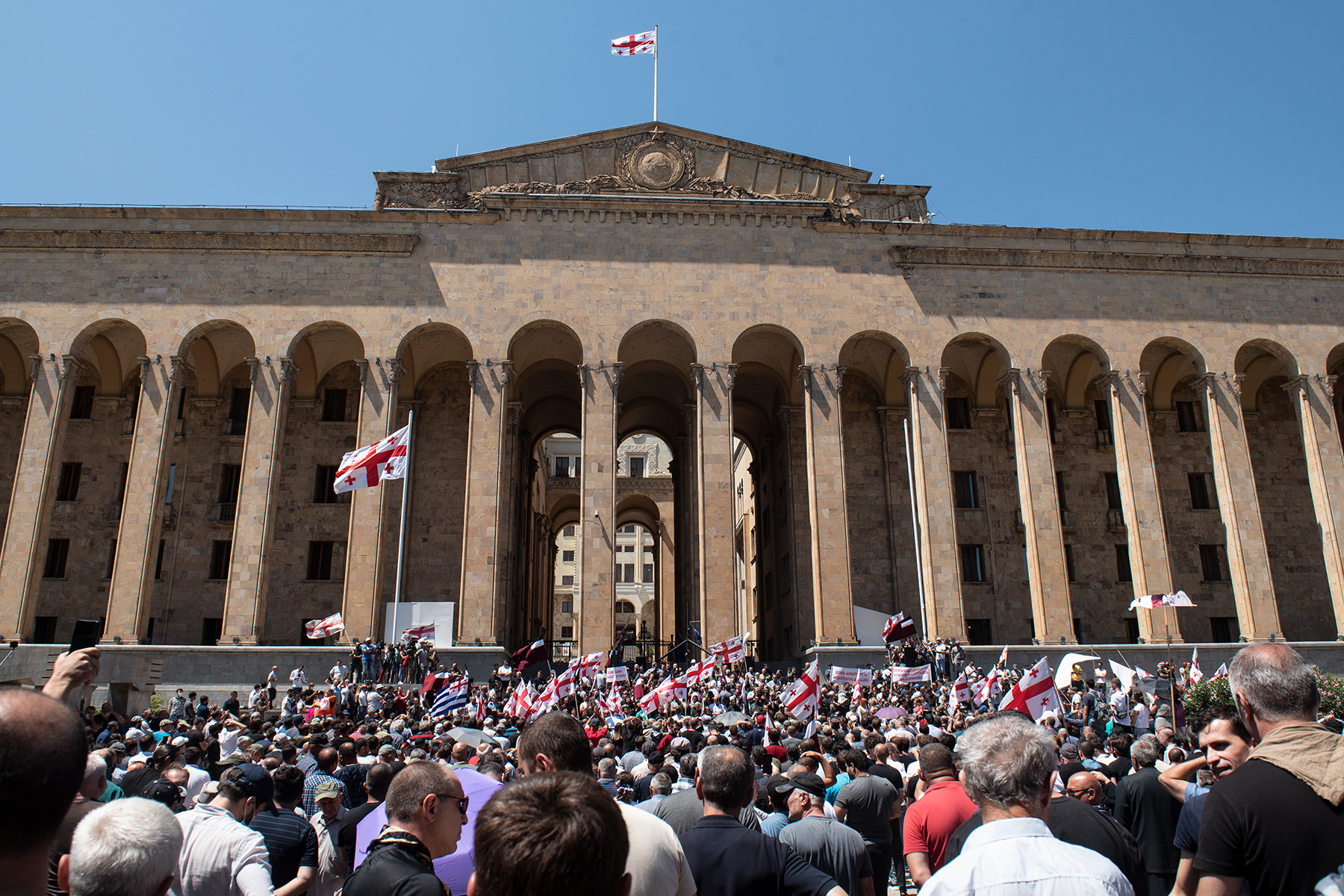
‘But for Georgia, it’s much more dangerous and complicated because, I’ll be very frank and open: Not everyone in the EU believes … that the EU needs Georgia as close as possible’
‘Such events don’t help bring Georgia close to the EU’, said Juknevičienė.
Charles Michel’s agreement — a missed opportunity
Speaking to OC Media before Georgian Dream withdrew from the agreement brokered by Charles Michel, Juknevičienė said the agreement ‘gave us a lot of hope that Georgia would be back on a civilised and pro-European track for the future of the people’.
In light of criticism that followed 5 July aggression, Georgian Dream’s withdrawal from the agreement delivered a hard blow to the glimmers of hope that domestic political deadlock would be breached. It demonstrated that the ruling party is ready to do whatever it takes to maintain power.
‘This is a very dangerous decision for the country’s development, its future, and most importantly, for stability’, Kornely Kakachia, the director of Georgian Institute of Politics, told OC Media. ‘Given that Charles Michel has invested so many resources on the highest level possible, it’s obvious that they won’t be indifferent to withdrawal’.
He elaborated that Michel’s intense involvement in Georgia was an attempt to save the country from isolation in a hostile region and help it maintain the title of frontrunner reformer as it once was.
‘However, these developments basically indicate that the EU’s efforts were vain’, he said.
‘By withdrawing from the agreement, the government is turning down the model of the country’s democratic development, the one that could be facilitated and guaranteed with the EU’s involvement.’
He added that the significance of this opportunity was underscored by the fact that Georgia’s political elites were incapable of reaching a consensus in the country’s interest.
But what does Charle’s Michel’s failure mean for Georgia from the Georgian government’s perspective?
‘I think that the Georgian Dream doesn’t care about that’, said Kakachia. ‘They are so preoccupied with maintaining power and saving themselves that they have lost adequacy with regard to foreign policy issues.’ He said the party likely feared a political vendetta if they were to lose power, an infamous Georgian political tradition of persecuting former government officials.

Indeed, Georgian officials from the ruling party have a different take on the issue. Maka Bochorishvili, the Chair of the Georgian Parliament’s EU Integration Committee told OC Media that the situation was ‘awkward’, but that Georgia’s strategic aspirations were not directly linked to Michel’s agreement because it was an agreement between Georgian political parties, not between Georgia and the EU.
‘We shouldn’t link this directly to our strategic goals or see a lot of negativity as if the existence of this agreement will determine the success of our strategic goals,’ said Bochorishvili. She added that despite criticism from the EU, Georgia was continuing to implement reforms to prepare to submit an EU membership application in 2024.
She elaborated that there were no question marks regarding Georgia’s democratic development because even though the events of 5 July were ‘absolutely negative and unimaginable,’ they were part of democratic development.
‘Such facts, when freedom of expression surpasses legal boundaries, are very common in EU member states as well. But this doesn’t mean that these countries are not democratic, right? We cannot call France non-democratic because anti-vaxxers broke windows, right?’ she quipped.
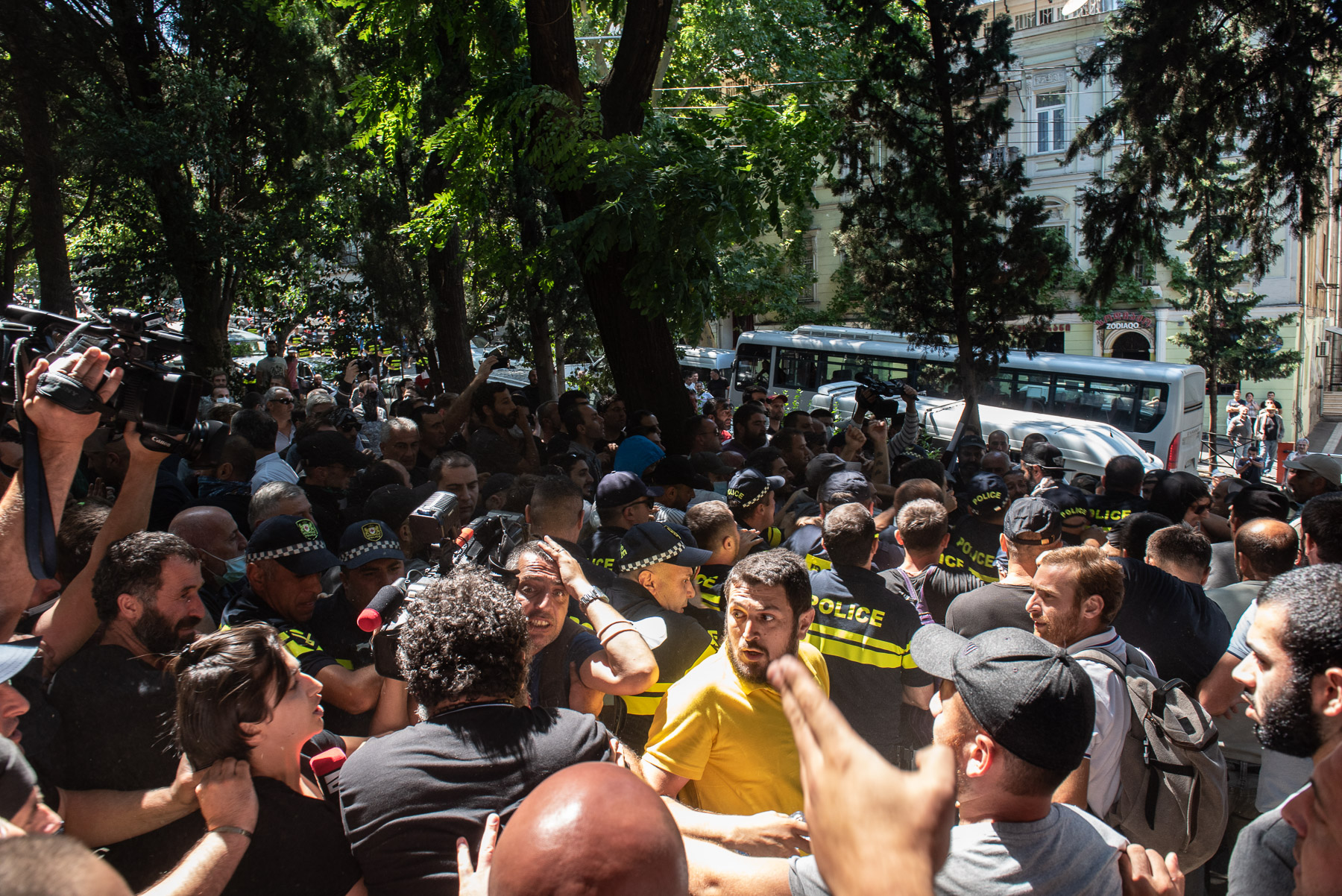
Bochorishvili’s attempts to minimise the significance of the unprecedented violence against journalists and queer activists again underscores the gap between Georgia’s domestic policies and foreign aspirations. It would appear that the country’s leadership naively hopes that the EU will lower the bar for Georgia, and judge it only based on its progress in fulfilling the EU–Georgia Association Agreement.
But will the EU have such a low bar?
Less for Less?
The Georgian government’s pledge to apply for EU membership in 2024 was part of their 2020 election campaign. Their promise focussed on the idea that Georgians historically belonged in Europe. However, the Georgian Dream has failed to grasp that EU membership is not conditioned upon their perception of historical justice but rather upon fulfilling the Copenhagen criteria.
The latter holds a respect for the rule of law and human rights at its heart as a key principle for membership. In this regard, European Council President Charles Michel voiced his concerns during his last visit to Georgia on 19 July.
‘Judicial reform is a core part of the 19 April Agreement and a condition [for] the disbursement of EU macro-financial assistance to Georgia’, he said.
He elaborated that ‘the recent fast-track confirmation of Supreme Court judges’ by the Georgian Dream government did not fully reflect the results of consultations with international and domestic stakeholders, which ‘was clearly a missed opportunity.’ Michel’s remarks, coupled with the accounts of recent large-scale human rights violations in Tbilisi, begged the question of whether future aid to Georgia would be conditional on such reforms.
On 31 August, Georgian PM Irakli Gharibashvili announced that the government was refusing to accept a €75 Million loan, the second tranch of a €150 million micro-financial assistance package. It seems Gharibashvili’s government tried to avoid embarrassment knowing that the EU intended to put the funds on hold. The move also demonstrated that the Georgian government is unwilling to comply with criteria that ensure an independent judiciary. In other words, the government is unwilling to soften its grip on power.
‘If this is not a serious enough situation to warrant an appropriate reaction, then I don’t know what will persuade the [European] Commission and the Council to react more strongly’, MEP Markéta Gregorová told OC Media in July.
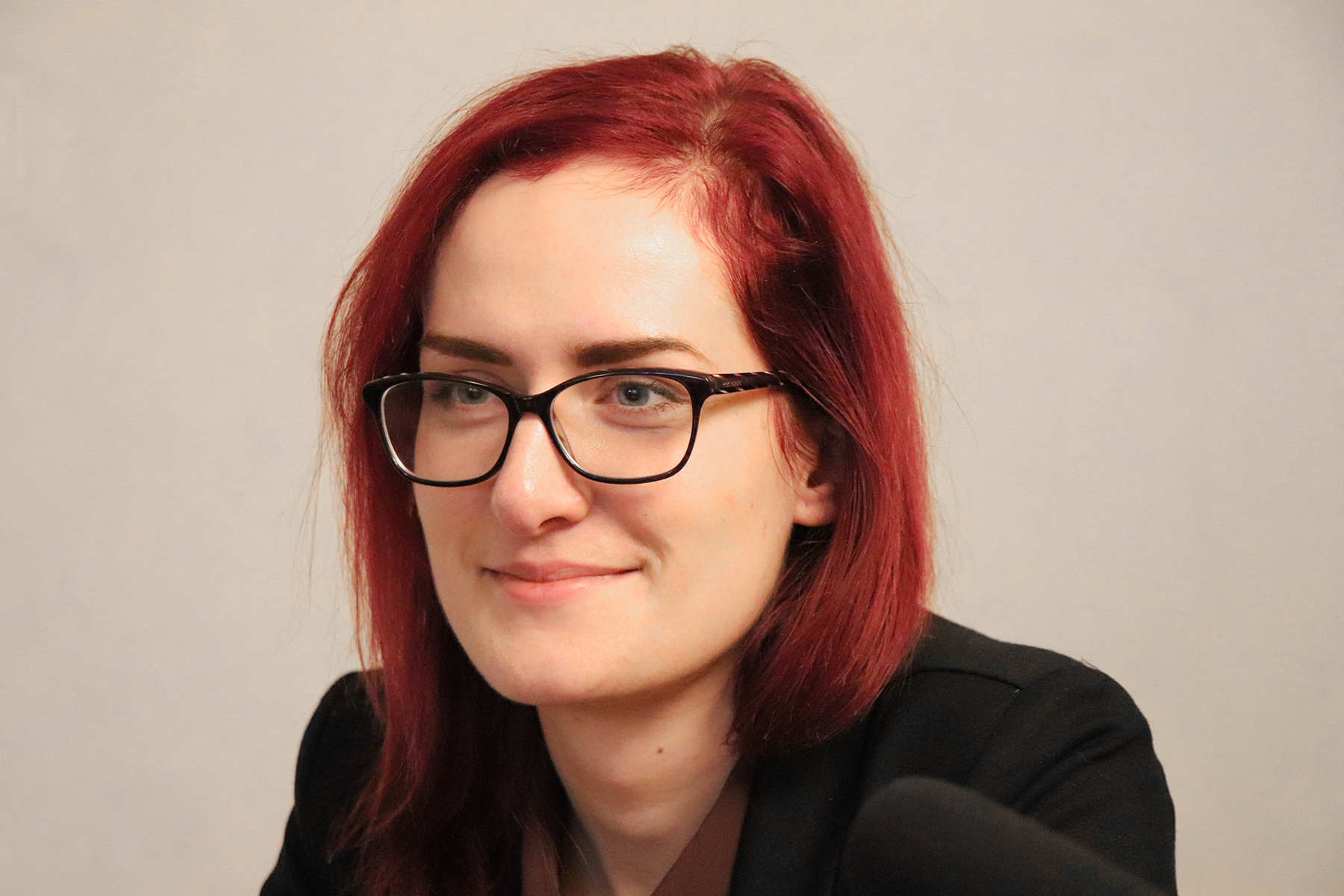
‘Again, it’s not about sanctioning ordinary citizens, but about sanctions against those who enabled this kind of harm.’
She laid out three possible responses from the EU. The first, and most serious, would be targeted sanctions; however, she said, there were fears this could push the Georgian government towards Russia.
The second was cutting financial support off if the government did not thoroughly fulfil its obligations under the EU–Georgia Association Agreement.
Finally, the third option would be to intensify support for civil society, which, Gregorová believes should be discussed even more intensively.
Those who OC Media spoke to said the EU was likely to prioritise applying conditions on further aid over sanctions.
‘It is possible that the EU will apply the conditionality principle and suspend financial aid’, Kornely Kakachia of the Georgian Institute of Politics, told OC Media.
‘As you know, the EU has used this with Moldova and Belarus on several occasions. It will be very negative for Georgia, but unless something changes, it’s unavoidable.’
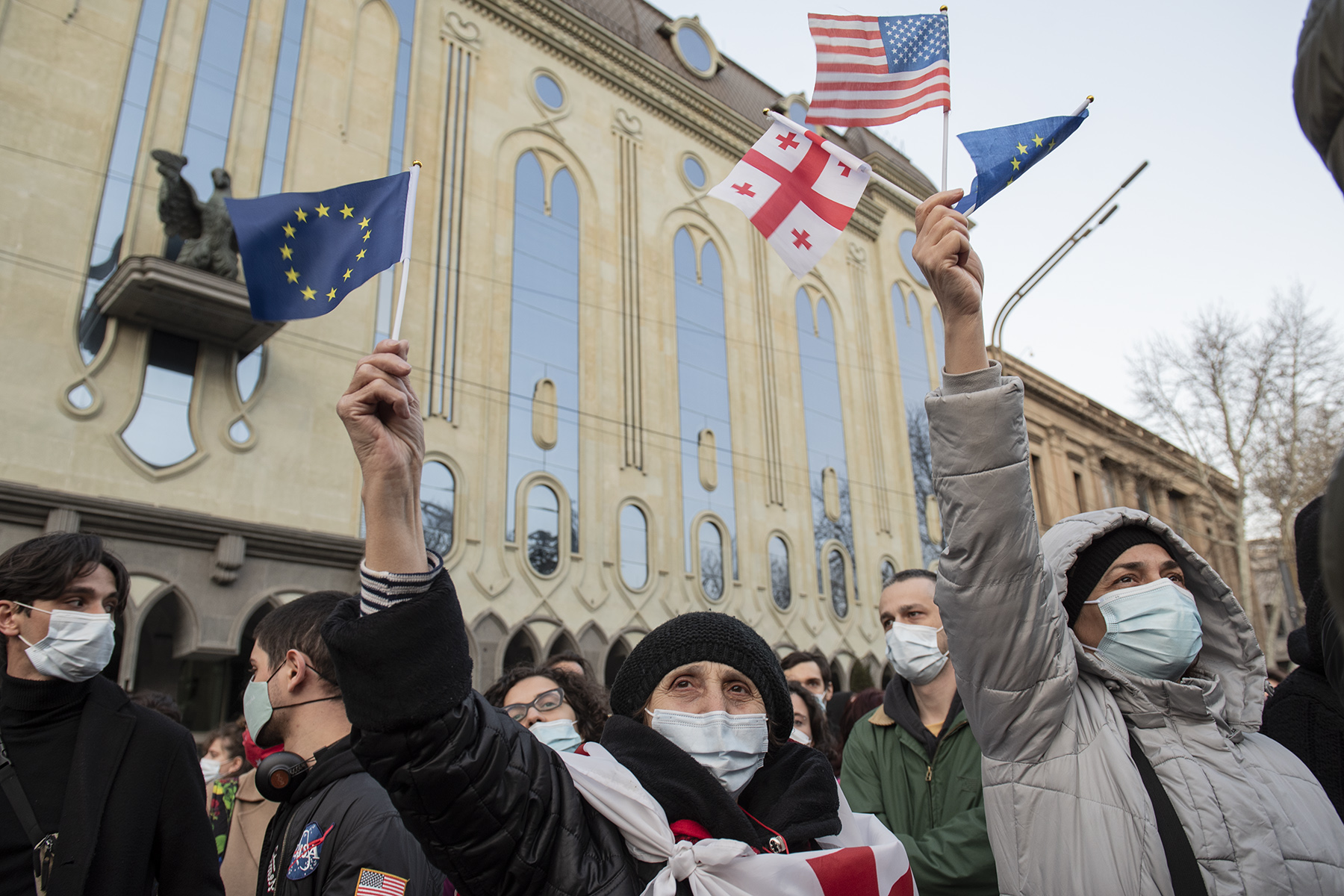
The EU has struggled to apply the conditionality principle within its own borders for some time. The illiberal governments in Poland and Hungary, heavily criticised by the EU for poor performance in terms of rule of law, have used loopholes to avoid this. For Georgia, however, there are no loopholes to escape through, while the EU’s impatience with disobedient members is only growing.
After Gharibashvili’s rejection of the EU funds, the acting Head of the EU Delegation Julien Crampes stated that ‘Georgia failed to sufficiently address the condition for this macro-financial assistance, and notably, to increase the independence, accountability and quality of the judicial system’.
This statement demonstrated that the application of the conditionality principle was already underway and that it is only a matter of time before it is applied.
While Gharibashvili’s government may have escaped this time, there is now more reason to believe that future financial assistance will also be conditional on reforms, especially of the judiciary.
Georgia’s future with the EU
‘A democratic process undertaken with the sole purpose to obtain a foreign “carrot” results in a facade of reform and is therefore problematic’, worries Ketevan Bolkvadze, Associate Senior Lecturer of Political Science at Lund University.
‘Sanctions must be the last resort, given that the EU takes into account not only domestic developments in Georgia but also the situation in the neighbourhood Georgia belongs to’, Bolkvadze told OC Media. ‘Belarus has quit the Eastern Partnership, the situation is tough in Azerbaijan, and there is a strong Russian influence in Armenia. Applying sanctions to Georgia might stand for its isolation, for which, I believe the EU is not ready given how many resources it has invested in the success of Eastern Partnership’, she said.
‘It’s very early to talk about EU membership. We see that Georgia is not ready to become an EU member. We are also aware that this initiative [to apply for membership in 2024] hasn’t been welcomed in EU countries, especially among western European countries. This is not to say that Georgia should not apply for EU membership, but do so only after careful preparations and reforming politicised state institutions’.
In 2017, when Georgia prided itself on its status as the frontrunner reformer among the six Eastern Partnership countries, the use of positive conditionality culminated in a visa waiver for Georgian citizens entering the Schengen Zone.
Despite the current domestic turmoil, in order to persuade the EU that Georgia maintains its ambitions, the Georgian Government has pledged to collaborate with Ukraine and Moldova in an Associated Trio format. The three countries have openly declared that they are ready to push reforms to speed up the process of accession.
However, with the recent demonstration of disrespect for human rights and the rule of law, the lines have blurred and Georgia has lost its moral superiority.
‘Personally speaking, [I find it hard to] believe that the ambitions for 2024 are anywhere than just on paper,’ MEP Markéta Gregorová told OC Media. ‘It’s just something that the government said to calm the EU, but it does not aspire to it at all. So, for me, it’s not just about reforms, but also [about] showing the will to do something, because right now, I really don’t believe that there is one,’
MEP Rasa Juknevičienė added that Georgian officials needed to be active and convince European capitals that Georgia delivers on its ambitions.
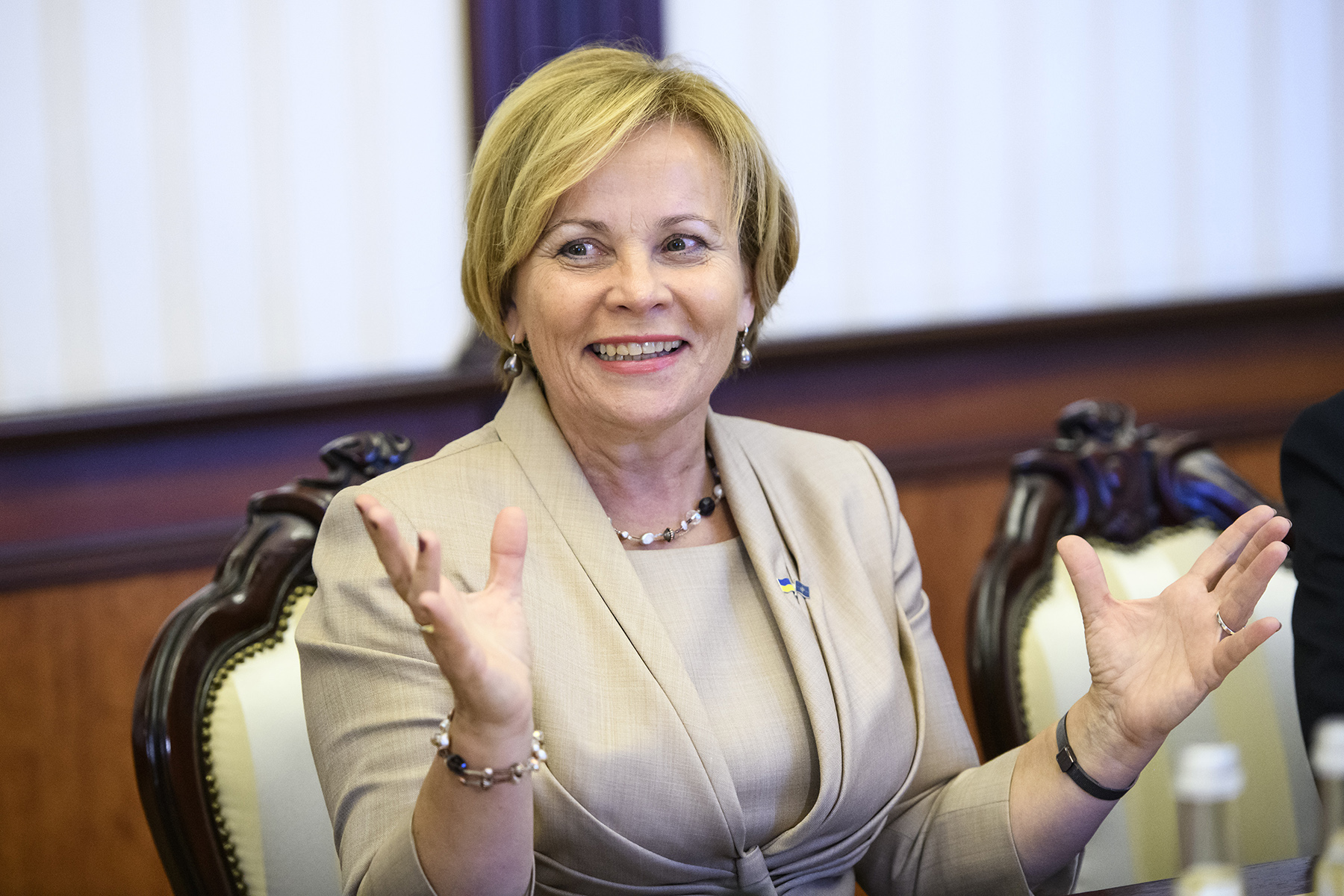
‘You have to understand that people in the Netherlands, Belgium, Germany, and other countries, they have their own challenges and they are not thinking about the situation in Georgia every day. Your politicians need to be active and do their best to convince the [European] capitals,’ said Juknevičienė.
‘So, my advice is, you are doing reforms, changing your country, but don’t do it to show it to leaders of the EU, but for your own people.’
For now, however, Georgia’s leadership has shown little interest in pursuing such reforms. ‘The Georgian court system is far superior to systems of current members, states’, the prime minister recently claimed.
He also hit back at critical MEPs, stating that they were not his boss but rather the Georgian people are. While such comments might win him the hearts of certain sections of the country’s conservative electorate, they are far from a shortcut to EU membership. While the Georgian government may wish for both, the country now stands at a crossroads and must decide which is more important.


